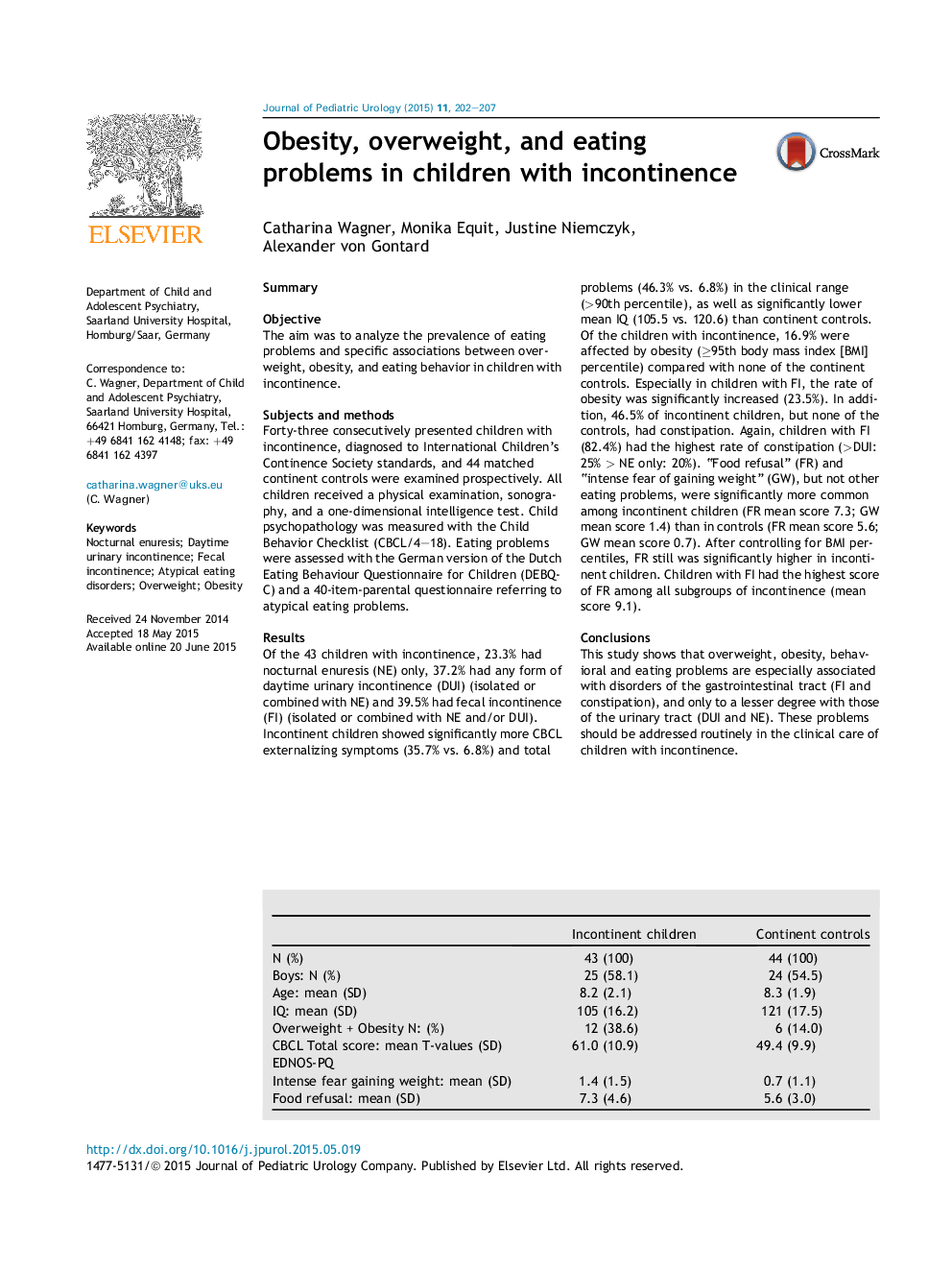| کد مقاله | کد نشریه | سال انتشار | مقاله انگلیسی | نسخه تمام متن |
|---|---|---|---|---|
| 4162185 | 1274273 | 2015 | 6 صفحه PDF | دانلود رایگان |
SummaryObjectiveThe aim was to analyze the prevalence of eating problems and specific associations between overweight, obesity, and eating behavior in children with incontinence.Subjects and methodsForty-three consecutively presented children with incontinence, diagnosed to International Children's Continence Society standards, and 44 matched continent controls were examined prospectively. All children received a physical examination, sonography, and a one-dimensional intelligence test. Child psychopathology was measured with the Child Behavior Checklist (CBCL/4–18). Eating problems were assessed with the German version of the Dutch Eating Behaviour Questionnaire for Children (DEBQ-C) and a 40-item-parental questionnaire referring to atypical eating problems.ResultsOf the 43 children with incontinence, 23.3% had nocturnal enuresis (NE) only, 37.2% had any form of daytime urinary incontinence (DUI) (isolated or combined with NE) and 39.5% had fecal incontinence (FI) (isolated or combined with NE and/or DUI). Incontinent children showed significantly more CBCL externalizing symptoms (35.7% vs. 6.8%) and total problems (46.3% vs. 6.8%) in the clinical range (>90th percentile), as well as significantly lower mean IQ (105.5 vs. 120.6) than continent controls. Of the children with incontinence, 16.9% were affected by obesity (≥95th body mass index [BMI] percentile) compared with none of the continent controls. Especially in children with FI, the rate of obesity was significantly increased (23.5%). In addition, 46.5% of incontinent children, but none of the controls, had constipation. Again, children with FI (82.4%) had the highest rate of constipation (>DUI: 25% > NE only: 20%). “Food refusal” (FR) and “intense fear of gaining weight” (GW), but not other eating problems, were significantly more common among incontinent children (FR mean score 7.3; GW mean score 1.4) than in controls (FR mean score 5.6; GW mean score 0.7). After controlling for BMI percentiles, FR still was significantly higher in incontinent children. Children with FI had the highest score of FR among all subgroups of incontinence (mean score 9.1).ConclusionsThis study shows that overweight, obesity, behavioral and eating problems are especially associated with disorders of the gastrointestinal tract (FI and constipation), and only to a lesser degree with those of the urinary tract (DUI and NE). These problems should be addressed routinely in the clinical care of children with incontinence.Incontinent childrenContinent controlsN (%)43 (100)44 (100)Boys: N (%)25 (58.1)24 (54.5)Age: mean (SD)8.2 (2.1)8.3 (1.9)IQ: mean (SD)105 (16.2)121 (17.5)Overweight + Obesity N: (%)12 (38.6)6 (14.0)CBCL Total score: mean T-values (SD)61.0 (10.9)49.4 (9.9)EDNOS-PQIntense fear gaining weight: mean (SD)1.4 (1.5)0.7 (1.1)Food refusal: mean (SD)7.3 (4.6)5.6 (3.0)Full-size tableTable optionsView in workspaceDownload as CSV
Journal: Journal of Pediatric Urology - Volume 11, Issue 4, August 2015, Pages 202–207
